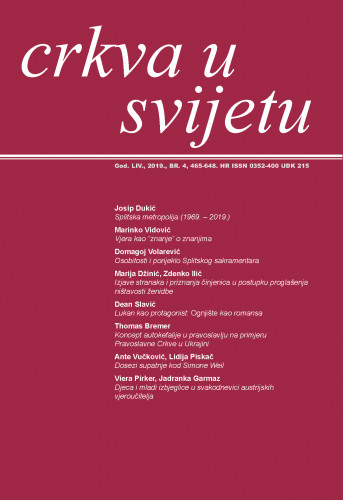U radu se istražuje vjeronauk kao mjesto koje promiče kulturu susreta povećanjem mogućnosti za interkulturalnu razmjenu, informiranje i širenje najboljih praksi integracije. U pet manjih poglavlja podastiru se rezultati religijsko-pedagoškog istraživanja sa Sveučilišta u Beču o ulozi vjeroučitelja u javnim školama s naglaskom na zajednički rad s izbjeglom djecom i mladima. U prvom poglavlju uvodi se u temu i aktualnu teologiju pape Franje o izbjeglicama. U drugom poglavlju predstavlja se projekt Sveučilišta u Beču, a u trećem se sažimlju rezultati. Četvrto i peto poglavlje nude nove perspektive glede teme. Prema istraživanju vjeronauk se dokazao kao mjesto ostvarenja dijaloga, zauzimanja za pravdu i dobrobit svakog čovjeka, koje promiče kulturu dijaloga, njeguje kulturu susreta i poboljšava kvalitetu suživota.; The paper explores religious education as a place that promotes the culture of encounter by enhancing opportunities for intercultural exchange, information and dissemination of the best practices of integration. The five smaller chapters present the results of a religious-pedagogical study from the University of Vienna on the role of catechists in public schools, with an emphasis on working together with refugee children and young people. The first chapter introduces the theme and current theology of Pope Francis on refugees. The second chapter presents the project of the University of Vienna, and the third summarizes the results. The fourth and fifth chapters offer new perspectives regarding the topic. According to the research, religious education has proved itself to be a place for dialogue, advocacy for justice and the well-being of every person, a place that promotes the culture of dialogue, nurtures the culture of encounter and improves the quality of coexistence.
Sažetak

 Crkva u svijetu : 54,4(2019) / glavni i odgovorni urednik, editor-in-chief Mladen Parlov.
Crkva u svijetu : 54,4(2019) / glavni i odgovorni urednik, editor-in-chief Mladen Parlov.